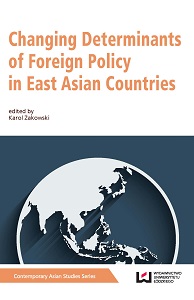Politicians’ Role in Foreign Policy Making in Japan before the Central Government Reform
Politicians’ Role in Foreign Policy Making in Japan before the Central Government Reform
Author(s): Karol Żakowski
Subject(s): Governance, Public Administration, Public Law, Economic policy, International relations/trade, Developing nations, Geopolitics
Published by: Wydawnictwo Uniwersytetu Łódzkiego
Keywords: Japan; foreign policy; decision–making process; prime minister’s leadership
Summary/Abstract: The decision–making process in Japan has been characterized by extensive powers possessed by the bureaucrats who often overshadowed their political superiors. Foreign policy making was not an exception. The Ministry of Foreign Affairs (MOFA) boasted strong control over Japan’s diplomacy. While the role of civil servants was theoretically limited to the implementation of the decisions made by politicians, in reality the administrative staff used a range of informal sources of power to act as arbiters of state matters. Only after the entry into force of Hashimoto’s administrative reform in 2001 did top–level decision makers gain new institutional tools that helped them to conduct an independent foreign policy on a more regular basis. Without denying this conventional wisdom, I argue that the politicians could occasionally play a significant role in Japan’s diplomacy even before implementation of institutional changes at the beginning of the 21st century. Under special circumstances, prime ministers, chief cabinet secretaries and foreign ministers were able to exert a considerable influence on the course of foreign policy, sometimes even changing its direction. Up to the 1990s the most influential figures in the government had enough authority to overcome the domination of the bureaucrats and impose their own will on MOFA.
Book: Changing Determinants of Foreign Policy in East Asian Countries
- Page Range: 73-87
- Page Count: 15
- Publication Year: 2017
- Language: English
- Content File-PDF

